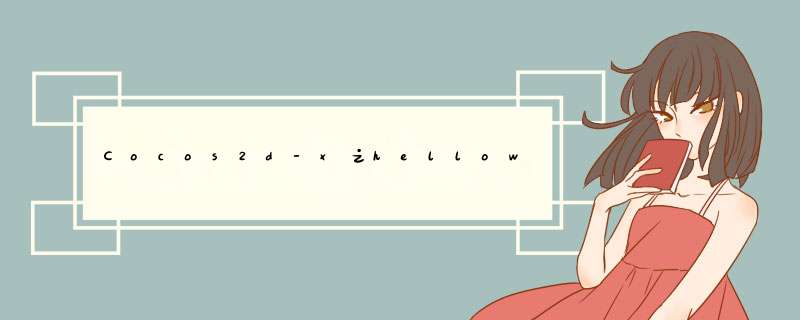
AppDelegate.h
</pre><pre name="code" >#ifndef _APP_DELEGATE_H_#define _APP_DELEGATE_H_#include "cocos2d.h"/**@brIEf The cocos2d Application.The reason for implement as private inheritance is to hIDe some interface call by Director.*/class AppDelegate : private cocos2d::Application{public: AppDelegate(); virtual ~AppDelegate(); virtual voID initGLContextAttrs(); /** @brIEf Implement Director and Scene init code here. @return true Initialize success,app continue. @return false Initialize Failed,app terminate. */ virtual bool applicationDIDFinishLaunching(); /** @brIEf The function be called when the application enter background @param the pointer of the application */ virtual voID applicationDIDEnterBackground(); /** @brIEf The function be called when the application enter foreground @param the pointer of the application */ virtual voID applicationWillEnterForeground();};#endif // _APP_DELEGATE_H_
AppDelegate.cpp
#include "AppDelegate.h"#include "HelloWorldScene.h"USING_NS_CC;//是Cocosd-x提供的一个宏,用来代替using namespace cocos2d语句AppDelegate::AppDelegate() {}AppDelegate::~AppDelegate() {}//if you want a different context,just modify the value of glContextAttrs//it will takes effect on all platformsvoID AppDelegate::initGLContextAttrs(){ //set OpenGL context attributions,Now can only set six attributions: //red,green,blue,Alpha,depth,stencil GLContextAttrs glContextAttrs = {8,8,24,8}; GLVIEw::setGLContextAttrs(glContextAttrs);}//游戏进入后台时调用的函数bool AppDelegate::applicationDIDFinishLaunching() { // initialize director auto director = Director::getInstance(); auto glvIEw = director->getopenGLVIEw(); //设置导演类的OpenGL视图 if(!glvIEw) { glvIEw = GLVIEwImpl::create("My Game"); director->setopenGLVIEw(glvIEw); } // turn on display FPS director->setdisplayStats(true);//设置在屏幕上是否显示帧率等信息 // set FPS. the default value is 1.0/60 if you don't call this director->setAnimationInterval(1.0 / 60);//设置定时器1.0/60秒间隔一次 // create a scene. it's an autorelease object auto scene = HelloWorld::createScene();//设置创建场景对象Scene // run director->runWithScene(scene);//运行该场景 return true;}//游戏进入后台时调用的函数// This function will be called when the app is inactive. When comes a phone call,it's be invoked toovoID AppDelegate::applicationDIDEnterBackground() { Director::getInstance()->stopAnimation();//停止场景中的动画 // if you use SimpleAudioEngine,it must be pause // SimpleAudioEngine::getInstance()->pauseBackgroundMusic(); //停止背景音乐}//游戏进入前台时调用的函数// this function will be called when the app is active againvoID AppDelegate::applicationWillEnterForeground() { Director::getInstance()->startAnimation();//开始场景中的动画 // if you use SimpleAudioEngine,it must resume here // SimpleAudioEngine::getInstance()->resumeBackgroundMusic();//继续背景音乐}
HelloWorldScene.h
#ifndef __HELLOWORLD_SCENE_H__#define __HELLOWORLD_SCENE_H__#include "cocos2d.h"class HelloWorld : public cocos2d::Layer{public: // there's no 'ID' in cpp,so we recommend returning the class instance pointer static cocos2d::Scene* createScene(); // Here's a difference. Method 'init' in cocos2d-x returns bool,instead of returning 'ID' in cocos2d-iphone virtual bool init(); // a selector callback voID menuCloseCallback(cocos2d::Ref* pSender); // implement the "static create()" method manually CREATE_FUNC(HelloWorld);};#endif // __HELLOWORLD_SCENE_H__
HelloWorldScene.cpp
#include "HelloWorldScene.h"USING_NS_CC;Scene* HelloWorld::createScene(){ // 'scene' is an autorelease object auto scene = Scene::create(); // 'layer' is an autorelease object auto layer = HelloWorld::create(); // add layer as a child to scene scene->addChild(layer); // return the scene return scene;}// on "init" you need to initialize your instancebool HelloWorld::init(){ ////////////////////////////// // 1. super init first if ( !Layer::init() ) { return false; } Size visibleSize = Director::getInstance()->getVisibleSize(); Vec2 origin = Director::getInstance()->getVisibleOrigin(); ///////////////////////////// // 2. add a menu item with "X" image,which is clicked to quit the program // you may modify it. // add a "close" icon to exit the progress. it's an autorelease object auto closeItem = MenuItemImage::create( "Closenormal.png","CloseSelected.png",CC_CALLBACK_1(HelloWorld::menuCloseCallback,this)); closeItem->setposition(Vec2(origin.x + visibleSize.wIDth - closeItem->getContentSize().wIDth/2,origin.y + closeItem->getContentSize().height/2)); // create menu,it's an autorelease object auto menu = Menu::create(closeItem,NulL); menu->setposition(Vec2::ZERO); this->addChild(menu,1); ///////////////////////////// // 3. add your codes below... // add a label shows "Hello World" // create and initialize a label auto label = Label::createWithTTF("Hello World","Fonts/Marker Felt.ttf",24); // position the label on the center of the screen label->setposition(Vec2(origin.x + visibleSize.wIDth/2,origin.y + visibleSize.height - label->getContentSize().height)); // add the label as a child to this layer this->addChild(label,1); // add "HelloWorld" splash screen" auto sprite = Sprite::create("HelloWorld.png"); // position the sprite on the center of the screen sprite->setposition(Vec2(visibleSize.wIDth/2 + origin.x,visibleSize.height/2 + origin.y)); // add the sprite as a child to this layer this->addChild(sprite,0); return true;}voID HelloWorld::menuCloseCallback(Ref* pSender){#if (CC_TARGET_PLATFORM == CC_PLATFORM_WP8) || (CC_TARGET_PLATFORM == CC_PLATFORM_WINRT) MessageBox("You pressed the close button. windows Store Apps do not implement a close button.","Alert"); return;#endif Director::getInstance()->end();#if (CC_TARGET_PLATFORM == CC_PLATFORM_IOS) exit(0);#endif} 总结 以上是内存溢出为你收集整理的Cocos2d-x之helloworld全部内容,希望文章能够帮你解决Cocos2d-x之helloworld所遇到的程序开发问题。
如果觉得内存溢出网站内容还不错,欢迎将内存溢出网站推荐给程序员好友。
欢迎分享,转载请注明来源:内存溢出

 微信扫一扫
微信扫一扫
 支付宝扫一扫
支付宝扫一扫
评论列表(0条)